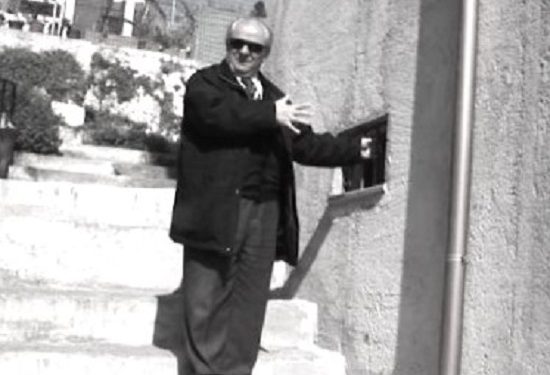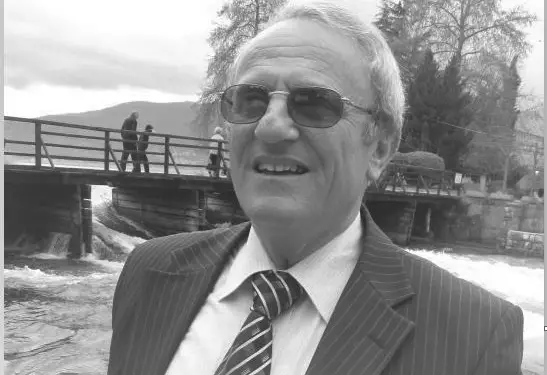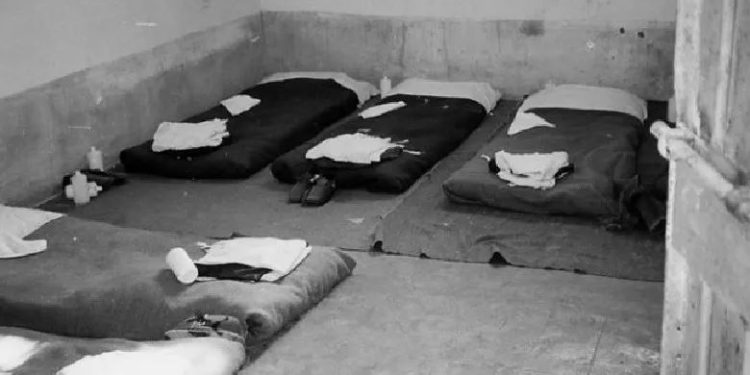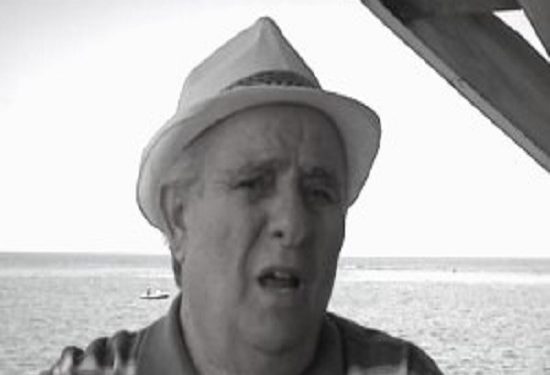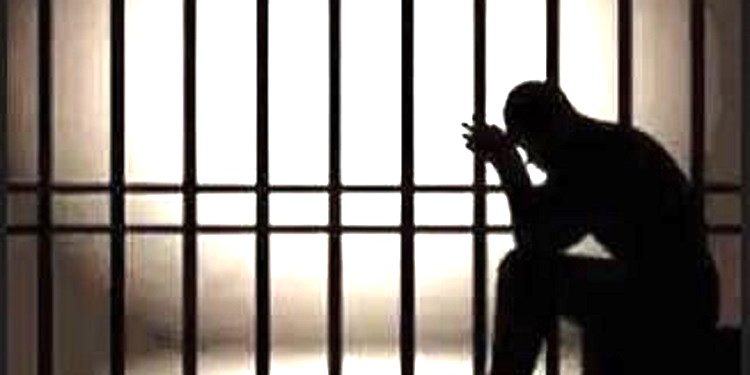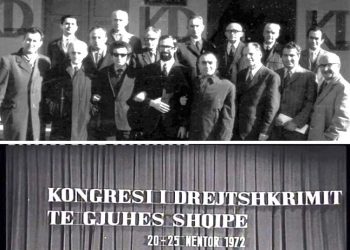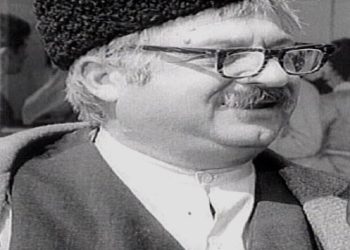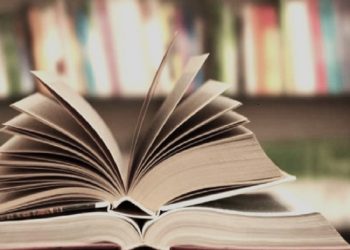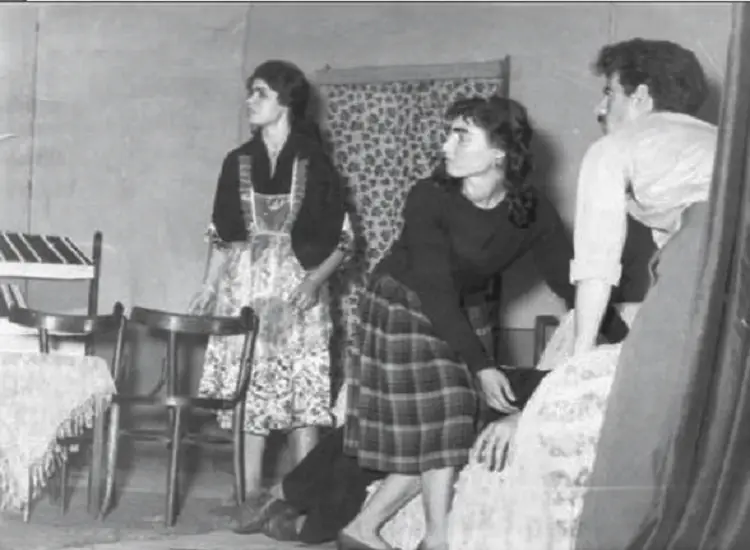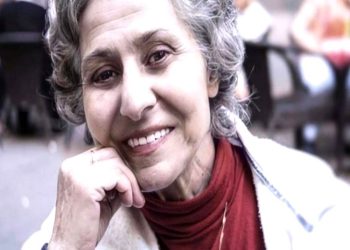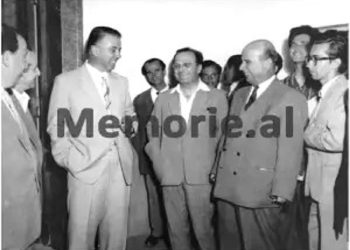From Shpendi Topollaj
The seventh part
Memorie.al / When the symbols of communism, after half a century of struggle, collapsed, there was such a loud noise that we woke up from our deep sleep. We opened our eyes, but not all of us believed what had happened: often, as a person sees some dreams that he takes for truth, he also sees some truths that he takes for dreams. Moreover, there were not a few who opposed this historic upheaval, with demonstrations and even threats. To overcome this situation, patience and wisdom were needed. We were brothers. As such, we had an intellectual, moral and spiritual duty to denounce the demagoguery of communism and the monstrous crimes of the red inquisition. Of course, the most reliable were those who had languished and suffered in prisons and exiles. Silence would really be a great sin of theirs…!
Continues from the previous issue
PEACE IS THE VIRTUE OF CIVILIZATION
– The book “Rebirth of the soul” by Hysen Haxhiaj –
The most deplorable crime of dictatorship is undoubtedly the destruction of noble minds. This crime becomes even more visible when the ugly edifice of the dictatorship itself crumbles and these noble minds, although in apparently more favorable conditions, respond to it humanely: only by writing poetry. And if the somewhat naive intelligence of ancient people, when it created hell, placed it either underground or, on a distant island, across the ocean, in a region never occupied by the sun’s rays, and as such to him, there was no reason why verses should not be dedicated to him, even for the worse, because the end was just an imagination, does the communist dictatorship, which made the whole of Albania hell, deserve to respond humanely with poetry?
Apparently, this question also torments those who were unjustly imprisoned and suffered and now in democracy, publish books, as our respected friend, Hysen Haxhiaj, who in his first book, entitled “Rebirth of the soul” says:
“Where can he resist it?
The world we lived in
Where is the mind to judge them?
The dramas we went through”.
By doing so, that is, by preferring only the pen, noble minds prove once again that in their subconsciousness, what Viktor Hygoi defined so beautifully: “Peace is the virtue of civilization, war is the crime of his”. Hysen Haxhiaj – n, I knew him twelve years ago, when the overthrow of the despotic system had created an atmosphere in which the zealous servants of Enverism, knowing that countless crimes were burdened upon them, could not find a hole to enter.
But he and his friends, for no moment, allowed themselves to lose control. Prisons and torture had brought them even closer to the universal values of humanity and the principles of democracy, and as democrats, they knew how to forgive, although no one ever thought of asking them for forgiveness. More clearly, the dignified attitude of these people was expressed by Hyseni himself when, referring to Kipling’s famous poem, he says:
“And in wrestling
do any whim,
that I hate you
me again
I will have mercy”.
Hysen Haxhiaj and his friends should not be misunderstood: they act humanely, not because they are afraid of anyone. Moreover, they know both from the culture they have and from experience that “being a slave to fear is the worst kind of slavery”. To be pitied are those who take this attitude as weakness. That’s why he continues: “You can’t understand, but you can’t even feel anymore that I laugh and laugh at your following, when you “follow” again. Yesterday’s persecutors “continue” because of the fact that, like many other things in this field, Albania is a country of paradoxes:
“I came out of hell with hope
to see democracy
I was very disappointed
that I prayed to God”.
And what was the path that led Hysen to the “appearance to avoid coincidence in this confusion”, with this book?
“They threatened me since I was little
In the middle, my dreams were cut off
My father was persecuted
they left me with my poor mother”.
In Corrush of Mallakastra, everyone knows the Haxhiaj family. They know it as a house that always kept its door open, especially for the contribution that its members have made for the freedom of the Motherland. His father, Ismaili, was the deputy commander of the territorial detachment of Mallakastra, whose commander was Baba Fejzon and, commissar, Hysen’s uncle, Qamil Hamzon.
He was the grandson of the patriot Bektash Haxhiaj, deputy of two legislatures of the Parliament of King Zog, who had been a delegate, both in the Congress of Lushnja and before, in the declaration of independence, where he met with the one who had thrown away the spaletas and the privileges of the general of the Ottoman Empire, you had accompanied Ismail Qemali in raising the flag. His other son, Qazim, stood out as one of the organizers and leaders of the Vlora War.
“Albania, my life
You know how much I love you
The story filled the pages
With your bravery”.
The pilgrims were rich. They had done everything with the sweat of their brow and with honesty. For the freedom of the Motherland, they spared nothing. They did not even spare blood for the Motherland. Thus, Xhevdet, Hysen’s brother, lined up with a gun in his hand in the ranks of the 11th Assault Brigade.
“Little laugh when you come
The necklace had a shadow.”
In 1945, being an officer, in an attempt, he was killed in Gomsiqe of Puka, taking with him, in the flower of youth, the pledge of an unrealized love. Hyseni himself was born on March 1, 1941. When he was only 4-5 years old, his father was arrested, and without any reason, he was sentenced to 25 years, of which he served a full 10 years in prison. Hyseni, still immature, would remember him, behind the barbed wire, that surrounded the prison camp in Lekaj i Kavaja, where they worked in very difficult conditions, for the winged construction of the canal that started from Beijing. In 1947, Hyseni came after his brother to Durrës, where he attended the unique school at “10 July” and then at “24 May”, while he finished high school in 1961 at “16 September” school.
The desire to learn led him to the Institute of Shkodra, to the mathematics-Physics department, where he had an inclination, but which he quickly stopped, for reasons of biography, and was sent to perform military service, not like everyone else, but in the Labor Brigade. It flowed from a rifle house, but the rifle could not be trusted. In 1968, he finished mechanical school at night and with persistence in 1970, continued the high school Electrical branch, always with the aim, to find the opportunity to study electrical engineering. He was registered most recently in this branch in the Durrës branch, but again he did not escape the infamous vigilance of the party and was expelled for his biography, being in his second year.
As he saw that all his efforts were in vain, he starts working at the ORMN, where he finds a good director named Stefan Stavri, who helps him become active in the festival of amateur theaters. He is distinguished for his talent in this field, but again he did not say it: completely unexpectedly on December 12, 1976, just because he had reproduced what he had heard from his father, about the cruel attitude of a leader of that time, towards the Italian prisoners, is arrested with the so-called “Group of art – culture”, which according to the masters of these scenarios, was led by Everst Kërliu.
The truth is that, thanks to his training and the treatment he received, he was oriented to secretly talk with his close friends, such as Namik Mane, Musa Verzivolli, Veip Bakiri, Irakli Sopi, Merushe Myshketa, Mehmet Bylykbashi, etc. , but never a word came out of them. Found by the investigation, proves the horrors of dungeon no. 1:
“I shoot the knife of life
Without mercy and without limits
I will not forget what I took away
Not even now in old age.”
This “dangerous hostile group”, for the fate of Albania, where young people were involved, such as; Astrit Qorri, Mit`hat Turkeshi and others, amidst a tragic solemnity, which is unfortunately often repeated in history, received an exemplary sentence: Hyseni himself was sentenced to 10 years in prison. After the advent of democracy, we often talk about the prisons of the dictatorship. They are reflected with great truth, from the pen of many who tried them, as; Arshi Pipa, Visar Zhiti, Pjetër Arbnori, Uran Kalakulla, Agim Musta, At Zef Pllumi, Gëzim Medolli, Dhora Leka, Gjergj Titani, Zyhdi Morava, Beqir Ajazi, Fatos Lubonja and I in this article, I will not dwell specifically on this aspect.
This is conditioned by Hysen Haxhiaj himself; in his book he did not have this goal, which is evident from the title he gave it; “Rebirth of the soul”, as if 10 years were not enough, in 1981, he was re-sentenced for another 10 years, which shows his invincible character. In the book he published before he passed away, my dear friend Uran Kalakulla, says that; “no one is a hero when you fall into prison, but you can do it there… – and it continues – The communist prison had two tasks: first, physical exhaustion to the extreme, through hard slave labor, bad food, dungeons beatings, in addition to re-convictions and up to physical elimination and secondly, personality deformation, possibly up to insanity, as well as moral degeneration of the given individual.
Who was able to resist these two traps, these two cunning tricks, he came out of prison, more human than he had been before, stronger, more seasoned, more cultured with the knowledge of life, if not books, capable and ready, for great works in the social field. There is no doubt that most of the generations of former political prisoners came out of such prisons.
Such men, Hysen Haxhiaj, knew a lot. He, both in written poems and in free conversations, remembers with respect and deep respect the colonel of the time of the Kingdom of Zogu, Shyqyri Selam (Pepe), who was also in prison with Hysen’s father, the honest colonel and talented, Andon Shetin. He mentions Luan Mufti, Qazim Toro, Agron Hadri, Adem Allçi, Gëzim Çela, Gëzim Pilkati, Ylvi Toro, Sander Sokol, who said that he had a dream that for five years he was either freed or dying and the dream came true, after at the end of this term, this wonderful officer, who had been a Skanderbeg, without any motive, was ignominiously killed.
Hysen remembers patriotic men, like Shik Stërmasi and Burhan Kalaja, who shed tears of pity, every time they saw women burdened like animals, beyond the barbed wire of Spaçi. He brings to mind the brave, like; Fadil Kokomani, Vangjel Lezho, Xelal Koprencka, who paid with their lives for the bravery of their idealism. Hyseni never forgets the Korçar Koço Veterniku, this artist who mastered seven foreign languages and who died for the shame of the dictatorship, from starvation.
Hysen Haxhiaj, don’t forget Kasem Trebeshina, who spent 23 years in prison and exile, and especially Sami Dangëlli, who, as if the 43 years in prison he had served were not enough, they let him die of appendicitis, not sending him to the hospital, when he was they transferred him to prison under a mocking name; “Progress” in the district of Saranda. Hyseni expressed his gratitude to all these men in poetry; “Our nation will never die”, dedicated to the central figure of Osman Kazazi:
“A man is born, a man flees,
The promise remained for us,
Never bowed to barbarism,
Leave my life behind”.
To write about the life of Hysen Haxhiaj or, something from what he has removed, you should know that he himself, in all 33 poems of this volume, almost only mentions them. Rather, he seems to have wanted to reveal his feelings, which had occupied his soul since early youth, and the torments of prison only strengthened them still more. Hyseni seems more preoccupied with the fate of the Motherland, democracy and the future. First of all, I feel obliged to write about the parents, brother, sister, virtuous wife of the honorable Haki Koka. He turns to his friends, with whom he went through severe trials, to his daughter, Belina:
“I didn’t cry because of the tears,
From nameless criminals,
Except you, when I remembered,
Oh, what I felt in my heart”.
He says: “I remembered you”, because there is another person dear to him, his wife Fadile, from the Agalli tribe, who remained loyal to him, without losing patience, swallowing the hot tears that she shed in solitude her:
“Beautiful flower, you don’t smell anymore,
The thorn tormented us so much,
Gathered forces and once,
That now spring has come”.
But in any case, Hysen Haxhiaj’s poetry in itself cannot hide the bitter taste of pain. In every line of hers, there is concern to make you think, and the first thought goes, without a doubt, to that ever-present statement of Chernishevsky, that: “In dictatorial regimes, meddling in politics is not a pleasant walk in the prospect “Nevski”, but it is prison, torture, bullet and rope”. And in order to never repeat in Albania, prison, torture, bullet and rope, Hysen’s poems seem to be a call to other fellow sufferers:
In the name of countless sacrifices, in the name of the ideals we defended, in the name of the suffering of our families, in the name of those who died in prisons and whose graves are unknown, in the name of our dear Albania, let us unite, put aside the trivialities and with our honest and experienced attitude in difficult days, let’s show the people who trust us, the way to go as brothers, towards progress. Since Hysen Haxhiaj, at the beginning of the book, refers to Kipling’s brilliant verses and since his immortal poetry is addressed to everyone, I am closing these lines with a stanza of poetry; “Në mundç”, selected from the impeccable translation of the great Fan Noli:
“If you can keep Teresa in your head,
When friends go crazy and guilty turn black,
If you can have faith, when you doubt
Anyone, and no one believes you,
If possible, and waiting to save,
When they lie, you don’t lie to them,
In the hate, you like a plow with horns,
And you don’t leave, neither wiser nor better”!
FROM THE FOREWORD OF THE BOOK “IMPRISONED IN LIRI”, BY HYSEN HAJJIAJT
…Here is Spaçi, the real hell and that he, after reading it in the masterful translation of Pashko Gjeçi, believed that; it was just a figment of the genius imagination of the great Florentine. What did he do in this loss?! The clouded mind told him that; “it would fill the barrel of the Danaids”. But no. It was even worse. He would enter together with his friends, up to 2500 meters deep, underground. Not even hell, it was no more! And there, under an unbearable temperature of 43 degrees, which was breath-taking and under an acid rain, which in the nakedness it imposed, left large burn marks on the skin, had to perform the Herculean norm, to dig and extract wagons whole with copper ore and pyrite.
Prisoners, sons of Albanian mothers, worked with brutal discipline, just like slaves in the past, without any guarantee for their lives. They had seen maiming and death, but there, life was devalued. She had lost her sense. The prisoners had no choice but to count the hours, days, weeks, months, years, but they had turned into days, weeks, months, years, and centuries, respectively. And this work continued and continued…! And again, that wasn’t the end. In 1981, Nazi officer F. S. Vet’ comes from the Department of Internal Affairs and meets Hysen, whom he promises to testify against someone who had arrested him. And how could he, the grandson of Bektash Çorrushi, do this?! The cure of the cure! “You will suffer worse” – they told him. “Let me suffer! Except to have a clean conscience”.
It was June. On July 7, he was re-sentenced to another ten years. Oh God! I remember the head. But now he knew, that evil had no limits…! He stayed in prison until June 13, when communism fell into the grave it had opened. 15 years had passed since his youth, from his best age. Here now, the air of freedom. The air that would fill the atrophied lungs of all Albanians with its oxygen. And he will honestly devote himself to her. No revenge. That’s why he started working with the Association of Former Political Persecutors. Prompted by Lamartini’s statement, that; “The biggest book is the book of life, which you cannot open or close at will”, he decided to write. He wrote to show…!
He remembered that sentence, that; “grief inspires my verse” and began to knit and publish poetry. He preached peace among the Albanians. It said: “We don’t ask for wages”. And he hoped a lot, as it appears in his book “Rebirth of the Spirit”. But unfortunately, he also noticed that now new phenomena were appearing, greed for power and wealth was flourishing. Even, there were those whom he had judged, like; people with dignity. But it’s strange; that old Latin was very right, who said: “Corruptio optima pessima”, who wanted to understand that; “When the good are corrupted, they become worse.”
This not only annoyed him, but forced him to pick up the pen again to write. And now, where we have his book; “Prisoners in freedom”, where he followed the desire of the muses for alternating songs and, in addition to poems, he also wrote prose. Hysen Haxhiaj’s prose also contains interviews, problematic articles, publicity, retorts and stories. All of them have in common the convictions of this author himself, who cannot forget what he and his friends lost from the communist dictatorship or, where the whole country collapsed, from the arriviste whims of Satan Enver Hoxha, who he could not get enough of Albanian power and blood.
He remembers the friends who stopped living, inside the prisons and camps, as a result of despair, torture and hard work. Not to mention the case when he had lost all hope and decided to jump towards the barbed wire, where death was more certain, from the machine gun of the soldier standing open and full of hatred, on top of the observation tower. But the friend does not allow him to do this senseless action. We must live, to speak. So, Rrno, tell me. And he survived, but his soul knows the cares he took away. He had seen unheard of horrors. And he was convinced that from now on, everything would take a different direction.
The country would go on the path of democracy, where efforts to honestly implement the ideals of those who fought and died, of those who killed their youth and who separated them from their mothers and fathers, from women and children, would lead the people to happiness. But it was not so easy; all kinds of obstacles and unforeseen phenomena appeared. The past was not shared as a curse. She was like a huge octopus, which with its tentacles, was not easily detached. Now he himself had his own views on life, on freedom, on honesty, and so on. The years in prison had sharpened a whole sense, unknown before.
He was not like everyone else, as he came from hell. And that, only Orpheus could explain, because even he could not escape the temptation, not to turn his head back. And when he didn’t like something, he wouldn’t hesitate to revolt and raise his voice. Because even democracy has its flaws. Where careerists, revengers, thieves with politicians’ masks came from. Someone took it for a living and they got incredibly rich. And the law as the law: a spider’s web that catches mosquitoes, while the jackals break and run away. No, he didn’t think so: poverty, injustice, endless fights and drugs, prostitution, all kinds of traffic… and the worst; for party interests, those of the Fatherland are sold.
And how could he remain silent, he who still felt himself a student of the obedience, manliness, wisdom and patriotism of Osman Kazazi with his friends, whom he had called; Promise. He criticizes without being a critic. Hits, without denigrating. Express disapproval, but always stressing that we are brothers. As the events unfold in Albania, he himself knows that somewhere he may not be completely accurate. But it is important that he does not close his mouth and does not remain a sorcerer. Even when someone with a primitivism of judgment and culture insults his patriotic grandfather, he responds with logic and without insults and anger. This is how Hyseni sets a very good example for politicians, analysts and intellectuals, of how controversy should be done. Two thousand years ago, the historian from Padua, Titus Livius, was very careful about this, so he said: “Absit iniurio verbo”! (Let it be said without insult). He often wears his opposition with notes of humor:
“They sigh on the vapor of tears,
I don’t give up easily,
We fought like Don Quixote,
Sancho panchos, take the armchairs”.
Didn’t Pythagoras say that; life is like a show where the bad guys get the best seats? And with all the disappointment he has, Hyseni, in the entirety of his poems, tries to remain human. He, as if to prove that he has noble feelings, includes here poems, which weave hymns to beauty, mother, sister or beloved daughter:
“Love is a big deal
It was not my fault and I deserted them
Sometimes you look like a toad
Sometimes like a seagull”.
These verses are enough to prove that Hysen’s soul did not dry up like the autumn flowers. He always remained fresh and beautiful. He remained a romantic dreamer: therefore, he remained human. A man who is grateful to everyone who stood by him in those difficult times. The verses dedicated to the sister’s husband, the good and brave man, Haki Koka, who not only helped her as much as he could, but also kept his family sacred, without wanting to know, from the pressures that were put on him, are significant. was seen during these years, where the children, now adults, earned the respect of everyone who knew them:
“I loved you like life
So much that I didn’t like myself
My eyes always remained on you
Like a sun full of dreams.
He also has this longing and love for his martyred brother:
Tears told your father
The ideal died in the ground
On gunpowder-colored wounds
Mountain crows are screaming”.
In all that he says in this book, both in prose and in poetry, Hysen Haxhiaj asks nothing more than not to be disappointed anymore, but to work and fight with idealism for the ideals of those who passed through the tunnels of communist hell. . And that’s what politicians do first. On the contrary, as Montenji ordered, that soul that did not say the long years of prison, if it did not have a certain goal, can be easily lost, now in freedom. And freedom itself can turn into a prison again. /Memorie.al




